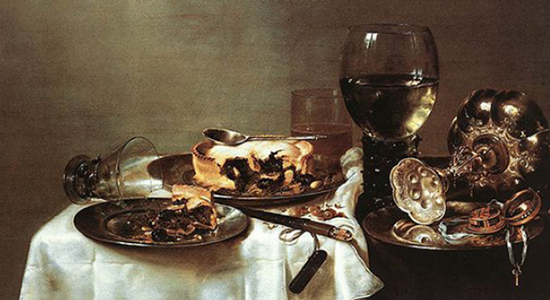Food and drink in feasting
 Food and Drink are essential to keep us alive, but they are thousand different ways to consume them. Their role in feasting is one aspect in that consumption.
Food and Drink are essential to keep us alive, but they are thousand different ways to consume them. Their role in feasting is one aspect in that consumption.
The choices, what is eaten and drunk, depend on cultural, social and political perspectives, and have very little to do with information about nutrition and health. What we eat is a question of food preferences, but how we eat, with whom we eat and where we eat is also important and the different practices are dependent on –in the widest meaning- cultural parameters.
Feasts play a special role in the consumption of food and drink; feasts might even be the reason why humans started to produce food. Dinners for professors, Christmas family meals, working feasts, royal inaugurations, healing parties and any other kind of feast will be the topic of the workshop. The role of food and drink in these feasts and their importance for society will be studied.
An international group of researchers from history, archaeology, anthropology and language-based backgrounds will present and discuss results from their recent studies of food and drink in feasting from all over the world. There will be plenty of discussion time.
The keynote speaker will be Prof. Ian Kuijt from Notre Dame University, who has studied the archaeological and societal aspects of feast in the early periods of the Middle East.
Programme
| Friday | ||
| 09:30-09:45 | Welcome | |
| 09:45-10:30 | Ian Kuijt | Introduction |
| 10:30-11:00 | Tea & coffee break | |
| 11:00-11:30 | Adonice-A. Baaklini & Margaux Spruyt | The Art of Feasting in Assyria: a General Approach between Materiality and Symbolic Value |
| 11:30-12:00 | Lone Claudi-Hansen | A feast for the afterlife. Roman impulses and local food traditions in Denmark in the first two centuries AD |
| 12:00-12:30 | Discussion | |
| 12:30-14:00 | Lunch | |
| 14:00-14:30 | Stefano Valentini | Sacer food in a place of worship |
| 14:30-15:00 | Susanne Kerner | Size does count. Pottery bowls for EBA feasting in the Levant |
| 15:00-15:30 | Tea & coffee break and discussion | |
| 15:30-16:00 | Dvir Shalem | Why are food and sex related? An Assyriological and Biblical answer. |
| 16:00-16:30 | Lisa Yeomans & Pernille Bansgaard | Evidence for a feast on wild boar in the Early Neolithic at Asiab in the Central Zagros, Iran |
| 16:30-17:30 | Discussion | |
| Saturday | ||
| 10:00-10:30 | Punsara Amarasinghe | Meat Feasts revealed in Ramayana ; Different reading on ancient Indian food culture |
| 10:30-11:00 | Morten Warmind | From meal to ritual? On the origins of the Eucharist |
| 11:00-11:30 | Elena Duce Pastor | Wedding feastings in Ancient Athens. A mix of civic duties and conspicuous consumption |
| 11:30-12:30 | Tea & coffee break and discussion | |
| 12:30-13:30 | Lunch | |
| 13:30-14:00 | Natia Phiphia | Role of Feast and Feasting in the 17th century Georgia |
| 14:00-14:30 | Antonio Pio Di Cosmo | The wine, mother and son: the Brumalia feast and its re-functionalization in Middle Byzantium |
| 14:30-15:00 | Tea & coffee and discussion |
There is no registration fee, but please note that the number of seats is limited and registration is mandatory. Use this form.

